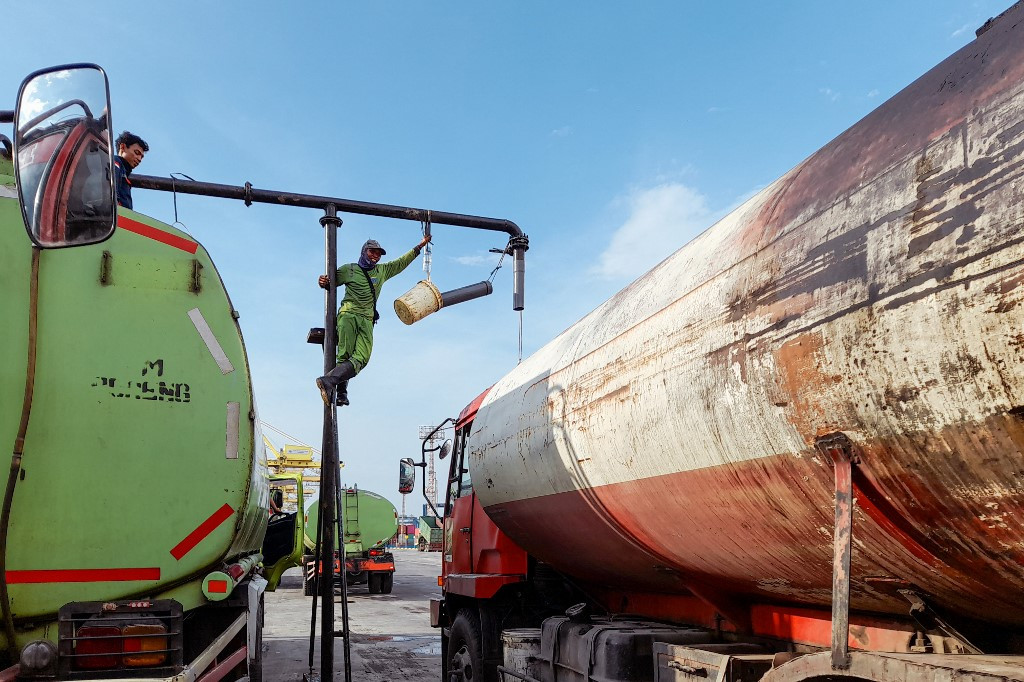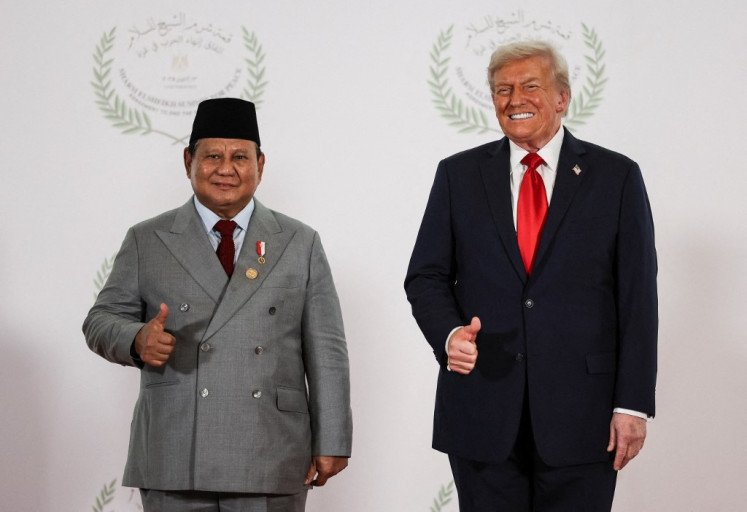Popular Reads
Top Results
Can't find what you're looking for?
View all search resultsPopular Reads
Top Results
Can't find what you're looking for?
View all search resultsIndonesia moved to 'flush out' palm oil after slow export resumption
The aim is to "flush out" shipments, Coordinating Maritime Affairs and Investment Minister Luhut Binsar Panjaitan said on Friday, but the frequent policy changes have unnerved edible oil markets and heightened concerns over global food prices at time when the Ukraine conflict has deprived markets of a chunk of sunflower oil supply.
Change text size
Gift Premium Articles
to Anyone
I
ndonesia, the world's biggest exporter of palm oil, has yet again reversed its export policy, looking to accelerate shipments just weeks after ending a three-week export ban aimed at maintaining domestic supply.
The aim is to "flush out" shipments, Coordinating Maritime Affairs and Investment Minister Luhut Binsar Panjaitan said on Friday, but the frequent policy changes have unnerved edible oil markets and heightened concerns over global food prices at time when the Ukraine conflict has deprived markets of a chunk of sunflower oil supply.
What Are The Latest Changes?
Indonesia, which usually accounts for about 60 percent of global palm oil supply, launched a programme this week to ship 1 million tonnes of palm oil products, or more, by the end of July.
It had banned exports from April 28 to May 23 to try to tame domestic prices. Upon lifting the ban, it adopted the Domestic Market Obligation (DMO), a measure aimed at ensuring supply.
But red tape has hampered shipments since. To resolve that, the government has allowed exports by companies that have not joined a programme for domestic bulk sales of cooking oil, provided they pay $200 per tonne, on top of export tax and levy.
To encourage shipments, it has also cut the maximum export tax and levy to $488 a tonne from $575, in hopes that the latest policy will free up some stockpiles, encouraging refiners to buy farmers' palm fruits again.
What Happens To The DMO?
The government will still require companies to sell some of their output domestically, on the basis of which regular export quotas will be determined.
During the transition since the export ban, Luhut said, companies have been allowed to export five times the volume of palm oil sold under the DMO scheme.
The government aim to secure 300,000 tonnes of cooking oil supply a month, the minister had said previously, or the equivalent of about 416,000 tonnes of crude palm oil (CPO).
The export volume in the acceleration scheme is in addition to the DMO export quota.
What Changes Were Made To Taxes?
The finance ministry has raised the maximum export tax for CPO to $288 a tonne when a government reference price exceeds $1,500 per tonne, a regulatory document reviewed by Reuters on Friday showed.
Previously the maximum was $200 a tonne when the CPO price exceeded $1,250.
However, overall fees for exports will fall as the maximum rate of export levy will be slashed to $200 a tonne from $375, Trade Minister Muhammad Lutfi said. Details of export levy rates have yet to be released.
Why Speed Up Shipments Now?
The Indonesia Palm Oil Association (GAPKI) said some palm oil mills in Sumatra have reached their storage capacity and have stopped buying palm fruits from farmers.
Slow resumption of exports coincided with peak harvest season and farmers complained they were struggling to sell their fruits, with mills offering low prices.
Prices of palm fruits have dropped by about 75 percent since the export ban was first announced, a farmers' group has said.
Authorities have said they want palm fruit prices to reach at least Rp 3,000 a kg. By Monday, the prices averaged 2,139 a kg, said Gulat Manurung, chairman of farmers group APKASINDO.
How Slow Has Export Resumption Been?
By Thursday, DMO export permits had been issued for about 460,000 tonnes of palm oil products, a trade ministry official said.
As of June 1, customs data showed nearly 40,000 tonnes of products loaded at ports in the regions of Sumatra and Kalimantan, bound for Greece, India, Pakistan, the United States and Vietnam.
Why Does Indonesia Want To Control Exports?
Domestic prices of cooking oil shot up amid high global prices, prompting an array of measures including the export ban, which brought a drop of 8 percent in prices to 16,500 a litre, though still off the government's target of Rp 14,000 ($0.9554).
Subsidies, export permits and a palm oil levy were also among the measures rolled out since November.
How Will The Latest Policy Changes Affect Global Supply?
Between its new programme and the DMO quotas, Indonesia could export nearly 2.5 million tonnes of palm oil in July, a GAPKI official has estimated, so long as the latest measure "goes well".
Before the ban, Indonesia typically sold 2.5 million to 3 million tonnes of palm oil products each month.











